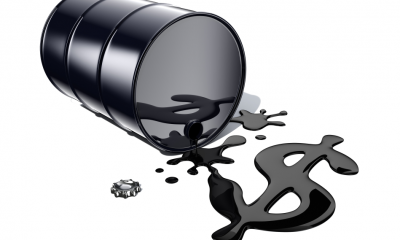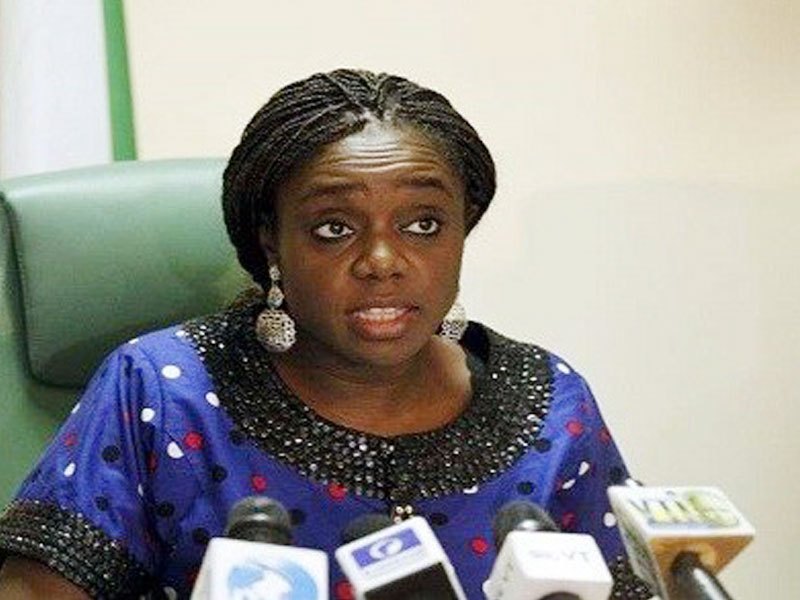Economy
Nigeria’s Excess Crude Account, Once Over $22bn, Depletes to $321m

By Dipo Olowookere
The balance left in the Excess Crude Account (ECA) of Nigeria as at Monday, January 20, 20120 was $321.4 million, Business Post has gathered.
Last week, the National Economic Council (NEC) held a meeting in Abuja, which was presided over by Vice President Yemi Osinbajo. The council comprises Governors of the 36 states of the federation, the FCT Minister and Governor of the Central Bank of Nigeria (CBN), Mr Godwin Emefiele.
At the gathering, NEC was informed of the amount left in the ECA and other special accounts of the federation, including the stabilization account, which stood at N31.8 billion as at Tuesday, January 21, 2020; the Development of Natural Resources Account, which had N97.0 billion as at January 21, 2020; and the Budget Support facility deduction which was in progress with N29 billion so far remitted to the CBN.
Business Post reports that the ECA was created by the administration of former President Olusegun Obasanjo in 2004 to keep the extra amount made from the sale of crude oil’s benchmark.
For instance, like in the 2020 budget, where the crude oil benchmark was set at $60 per barrel, anytime the commodity is sold above $60, the excess is saved in the ECA for rainy days and this helped the country during the 2008 global financial meltdown as it was not felt by Nigeria.
However, the tradition of not touching the ECA was broken under the administration of late Umaru Yar’Adua, when Governors under the aegis of the Nigerian Governors Forum led by former Senate President and then Governor of Kwara State, Mr Bukola Saraki, instituted a lawsuit at the Supreme Court in 2008 to seek an injunction to force federal government to share what is left in the account.
When Mr Obasanjo handed over power to late Mr Yar’Adua in 2007, according to the Ministry of Finance, the balance in the ECA was $9.43 billion and in 2008, he grew the amount to over $22 billion, the highest ever in Nigeria’s history. However, he passed on in 2010 and his deputy, former President Goodluck Jonathan, was sworn in as an acting President in May 2010.
Under the Jonathan administration, the ECA depleted as a result of his heeding to the demand of the Governors and it was reported that the amount decreased to about $4 billion by 2010.
In 2015, when the present administration of President Muhammadu Buhari commenced, the sum of $2 billion, according to a former Minister/Deputy Chairman of National Planning Commission, Mr Abubakar Olarenwaju Sulaiman, was left by the Jonathan government for Mr Buhari.
In 2016, when the state Governors asked the Buhari administration to share the ECA, what was then left was about $2.3 billion.
In 2018, during a briefing with newsmen in Abuja on outcome of the NEC meeting, Governor of Kano State, Mr Abdullahi Umar Ganduje, said the former Minister of Finance, Mrs Kemi Adeosun, informed the council that as at Monday, January 15, 2018, the amount left was $2.3 billion and Mrs Adeosun later said in June of same year, 2018, that the balance had declined to $1.9 billion. This was after government had removed $1 billion from the account to fight terrorism in the country despite opposition from the opposition party, the Peoples Democratic Party (PDP).
As at October 2019, the amount left in the ECA was $324 million, but according to NEC, in an update of its last meeting in Abuja, the money has now reduced to $321 million.
During the meeting, Chairman of the NEC Committee on the matter and Governor of Kaduna State, Mr Nasir El-Rufai, briefed the council on the proposed consideration of 20 percent of pension funds to be invested in infrastructural projects such as rail, roads and electricity.
On the review of the status of the ownership structure of the electricity power Distribution Companies (DISCOs), he said plans were ongoing to determine the level of investment/ownership of states and federal governments in the Discos, and requested NEC to, among other things, place media advertisements for the public to submit memoranda on the way forward for the electricity sector.
NEC approved the prayers of the Committee that stakeholders in the sector be engaged, and that submissions from the public be received for analysis.
Also briefing NEC on polio eradication and improved routine immunization in Nigeria, the Minister of Health, Mr Osagie Emmanuel Ehanire, said Nigeria was on course to attaining polio-free status by June 2020, noting that the country has not recorded any new case of polio infection in the last three and half years.
He said there are incidences of Lassa Fever in some states namely; Edo, Kano, Ondo, Ebonyi and Taraba resulting in 84 cases and 15 deaths, noting that the National Centre for Disease Control has been alerted and is on top of the situation.
Mr Ehanire reported to council that the use of paracetamol to cook meat and the consequences that comes with it as well as the use of Aspirin to purify water, are deadly practices that damages major body organs, warning that these practices should be avoided.
He also briefed council on the Coronavirus that emerged in China, which has spread to four border countries such as United States of America, Thailand, Japan and Korea.
During his presentation, the Emir of Kano, Muhammadu Sanusi II, made the presentation to the council in his capacity as the Chairman of the Board of Trustees of the Nutrition Society of Nigeria.
Mr Sanusi, who titled his presentation a Call for Action, said “over 12 million children are stunted in Nigeria, while 2.6 million are wasted annually due to malnutrition,” adding that Nigeria records the highest number of stunted children in Africa.
According to the monarch, malnutrition accounts for 53 percent of deaths among children as high child mortality and stunting are linked to deficiencies in key micronutrients (vitamin A, Iron, Zinc and Calcium), macronutrients (Carbohydrates, Protein, Fats) and associated poor feeding practices, as well as overall nutritional status of the mother.
The Emir, who stated that the burden of malnutrition which include stunting, under-weight, obesity and other diet related non-communicable diseases, can be treated, said, “65 percent of dietary energy supply is derived from cereals, roots and fibres indicating low dietary diversity.”
Continuing, he said basic causes of malnutrition are poverty, socio-cultural, economic and political environment.
At the gathering, NEC appealed to states and local governments to deal with the problem by investing more in issues relating to malnutrition, adding that states should key into the World Bank sponsored programme on nutrition.
Economy
Lokpobiri Begs Lawmakers to Reschedule Oil Revenue Executive Order Probe

By Adedapo Adesanya
A joint National Assembly probe into President Bola Tinubu’s new oil revenue executive order was stalled on Thursday following a request for more time by the Minister of Petroleum Resources, Mr Heineken Lokpobiri.
The hearing was convened to scrutinise the executive order directing that royalty oil, tax oil, profit oil, profit gas and other revenues due to the Federation under various petroleum contracts be paid directly into the Federation Account.
Mr Lokpobiri told lawmakers that although he attended out of respect for parliament, he had been notified of the hearing only a day earlier and had not obtained all the relevant documents needed to defend the policy adequately.
He appealed for the session to be rescheduled.
Co-chairman of the joint committee and Chairman of the Senate Committee on Gas, Mr Agom Jarigbe, put the request to a voice vote, and lawmakers approved the adjournment.
A new date is expected to be communicated to the minister.
The executive order signed last week also scrapped the 30 per cent Frontier Exploration Fund created under the Petroleum Industry Act (PIA) and discontinued the 30 per cent management fee on profit oil and profit gas previously retained by the Nigerian National Petroleum Company (NNPC) Limited.
Anchored on Sections 5 and 44(3) of the Constitution, the presidency said the directive was aimed at safeguarding oil and gas revenues, curbing excessive deductions and restoring the constitutional entitlements of federal, state and local governments to the
However, the order has sparked criticism within the industry, one of which was from the Petroleum and Natural Gas Senior Staff Association of Nigeria (PENGASSAN), whose president, Mr Festus Osifo, called for an immediate withdrawal of the order, warning that it could undermine the PIA and erode investor confidence.
Meanwhile, at another session, the Chairman of the Senate Committee on Finance, Senator Mohammed Sani Musa, disclosed that President Tinubu would soon transmit proposals to amend certain provisions of the PIA to align with current economic realities.
He noted that while many expect the executive order to boost revenue automatically, Nigeria has yet to achieve its desired income levels.
He did not specify which sections of the law would be targeted, but suggested that the drive to enhance revenue generation would necessitate legislative adjustments.
The PIA, signed into law in 2021 by the late ex-President Muhammadu Buhari, overhauled the governance, regulatory and fiscal framework of Nigeria’s oil and gas sector, commercialised the NNPC and restructured revenue-sharing arrangements.
Economy
NGX Group Declares N2 Final Dividend, 1-for-3 Bonus Issue for FY’25

By Aduragbemi Omiyale
Shareholders of Nigerian Exchange (NGX) Group Plc will receive one new share for every three held as of April 10, 2026, as a bonus, according to a proposal from the board.
This is in addition to a final dividend of N2.00 proposed by the board to shareholders for the 2025 fiscal year, which raised the total dividend for the year to N3.00, according to the financial statements of the company filed with NGX Limited.
Last year, NGX Group recorded a sterling performance, with its earnings growing by 36.0 per cent to N22.9 billion from N16.9 billion due to sustained growth across core business segments, improved customer penetration on the back of increased investor activity and rising investor confidence.
The operating profit in the year increased by 44.4 per cent to N11.8 billion, while pre-tax profit jumped to N15.6 billion from N13.6 billion in 2024, with the earnings per share (EPS) at N4.75.
As for its balance sheet, total assets increased to N71.0 billion from N68.0 billion, while shareholders’ equity strengthened to N55.2 billion
The improved debt-to-equity position reflects a conservative capital structure, enhanced solvency profile, and strong retained earnings growth.
“Our 2025 performance demonstrates the resilience of our business model and the effectiveness of disciplined strategic execution. Strong revenue growth, improved operating margins and a strengthened balance sheet reinforce our commitment to delivering sustainable long-term shareholder value.
“The increased dividend and bonus issue reflect the Board’s confidence in the sustainability of our earnings and the robustness of our capital position as we continue to deepen Nigeria’s capital markets.
“We are confident that the momentum that we have built in 2025 will be sustained, given investor confidence in the Nigerian capital market and a pipeline of exciting new listings that will broaden and deepen the market,” the chairman of NGX Group, Mr Umaru Kwairanga, said.
On his part, the chief executive of the organisation, Mr Temi Popoola, said, “We delivered strong top-line growth and enhanced profitability in 2025 despite macroeconomic headwinds.
“Our 36 per cent core revenue growth, improved operating efficiency and successful deleveraging have strengthened our capital base and financial flexibility, supporting the increased dividend and bonus issuance.
“As regulatory standards evolve, including the recent upward review of minimum capital requirements by the Securities and Exchange Commission (SEC), our robust balance sheet positions us to meet new thresholds seamlessly while continuing to invest in liquidity expansion, product innovation and market infrastructure to build a resilient, globally competitive exchange group.”
Economy
FG Targets Credit Access For 50% Workers By 2030

By Adedapo Adesanya
The Vice President, Mr Kashim Shettima, inaugurated the Board of the Nigerian Consumer Credit Corporation (CREDICORP) and gave a 50 per cent access target for workers, saying consumer credit was critical to Nigeria’s ambition of becoming a one-trillion-dollar economy by 2030.
According to him, President Bola Tinubu established the CREDICORP to build a trusted credit infrastructure, provide catalytic capital to lower borrowing costs, and help Nigerians overcome long-standing cultural resistance to credit.
Speaking on Thursday in Abuja when he inaugurated the board on behalf of the President, the Vice President, in a statement by his spokesman, Mr Stanley Nkwocha, said that the quality of life of Nigerians cannot improve without closing the gap between access to capital and human dignity.
“A civil servant who earns honestly does not have to chase sudden wealth just to buy a vehicle, or save for ten years to buy one. A young professional should not remain in darkness simply because solar power must be paid for all at once,” the Vice President said.
VP Shettima disclosed that in just one year of operations, CREDICORP has disbursed over ₦37 billion in consumer credit to more than 200,000 Nigerians, with over half of them accessing formal credit for the first time.
The Vice President said the organisation was specifically tasked with building credit infrastructure to bridge the trust gap between lenders and borrowers, providing wholesale capital and credit guarantees through its portfolio company.
“Ultimately, these critical jobs of CREDICORP will enable access to consumer credit to at least 50 per cent of working Nigerians by 2030,” he said.
The Vice President explained that the new board’s role was not ceremonial as they are custodians of the organisation’s mission, adding that the long-term strength of the institution would depend on their “vigilance, integrity, sacrifice, and commitment.”
He directed Board members to uphold Public Service Rules, the Board Charter, and all applicable governance frameworks, warning that accountability and stewardship of public resources were non-negotiable.
The Chairman of CREDICORP, Mr Aderemi Abdul, expressed appreciation to President Tinubu for his vision behind the formation of CREDICORP and for the confidence reposed in them, noting that the establishment of the corporation marked an important step towards strengthening the nation’s financial architecture.
He assured President Tinubu that the board understands its responsibility and will guide the institution to deliver meaningful benefits to Nigerians.
For his part, Mr Uzoma Nwagba, Managing Director/CEO of CREDICORP, recalled watching President Tinubu say 20 years ago that consumer credit is one of the major tools that will improve the lives of Nigerians.
He noted that over the past 18 months, the institution has benefited more than 200,000 Nigerians, including students.
He assured that the presidential vision behind CREDICORP would not be taken lightly, as the team considers their appointments a unique, once-in-a-lifetime opportunity.
Other members of the board inaugurated include Mrs Olanike Kolawole, Executive Director, Operations; Mrs Aisha Abdullahi, Executive Director, Credit and Portfolio Management; Mr Armstrong Ume-Takang (MD, MoFI), Representative of MoFI; Mrs Bisoye Coke-Odusote (DG, NIMC), Representative of NIMC; and Mr Mohammed Naziru Abbas, Representative of FMITI.
Others are Mr Marvin Nadah, Representative of FCCPC; Mrs Chinonyelum Ndidi, Representative of the Federal Ministry of Finance; Mr Mohammed Abbas Jega, Independent Director; and Mrs Toyin Adeniji, Independent Director.
-

 Feature/OPED6 years ago
Feature/OPED6 years agoDavos was Different this year
-
Travel/Tourism10 years ago
Lagos Seals Western Lodge Hotel In Ikorodu
-

 Showbiz3 years ago
Showbiz3 years agoEstranged Lover Releases Videos of Empress Njamah Bathing
-

 Banking8 years ago
Banking8 years agoSort Codes of GTBank Branches in Nigeria
-

 Economy3 years ago
Economy3 years agoSubsidy Removal: CNG at N130 Per Litre Cheaper Than Petrol—IPMAN
-

 Banking3 years ago
Banking3 years agoSort Codes of UBA Branches in Nigeria
-

 Banking3 years ago
Banking3 years agoFirst Bank Announces Planned Downtime
-

 Sports3 years ago
Sports3 years agoHighest Paid Nigerian Footballer – How Much Do Nigerian Footballers Earn

















